The Aesthetics of Brick Fireplaces
Brick fireplaces, while often seen as a charming focal point in many homes, can sometimes appear outdated or unattractive. Understanding the reasons behind this perception is crucial for homeowners looking to enhance their living spaces. One primary factor contributing to an ugly brick fireplace is its age. Older brickwork can become discolored, chipped, or cracked over time, leading to an unsightly appearance. Additionally, the style of brick used decades ago may not align with modern design trends, making the fireplace look out of place in a contemporary setting.
The condition of the mortar also plays a significant role in the fireplace’s overall look. Mortar can deteriorate and crumble, creating an uneven and unattractive surface. This not only affects the fireplace’s aesthetics but can also raise safety concerns. Another aspect to consider is the color of the brick. Traditional red or brown bricks might clash with current interior color schemes, while the soot and smoke residue can further darken and stain the bricks, compounding the problem.
Design trends have shifted over the years, with many homeowners now preferring sleek, minimalist looks over the rustic charm of exposed brick. This shift means that a brick fireplace that once added warmth and character might now seem bulky and outdated. The presence of a large, dark, and dominant brick structure can make a room feel smaller and more closed in, which is often undesirable in modern open-plan living spaces.
.jpg)
Moreover, the maintenance of a brick fireplace can be labor-intensive. Regular cleaning to remove soot, ash, and debris is necessary to keep it looking its best. Without proper care, the build-up of dirt can make the fireplace appear neglected and dirty. Homeowners might find the upkeep challenging, leading to a decline in the fireplace’s appearance over time.
In some cases, the sheer size and placement of the brick fireplace can disrupt the flow of a room’s design. A large, centrally placed fireplace might dominate the space, making it difficult to arrange furniture or incorporate other design elements effectively. This can lead to a feeling of imbalance within the room, detracting from the overall aesthetic appeal.
Finally, personal taste plays a significant role in how a brick fireplace is perceived. While some people appreciate the classic, rustic look of brick, others might find it too old-fashioned or imposing. This subjectivity means that what one homeowner sees as charming and cozy, another might view as an eyesore. Understanding these varied perspectives is key to addressing and improving the aesthetics of an ugly brick fireplace.

Creative Solutions for Improving Brick Fireplace Aesthetics
Transforming an unattractive brick fireplace into a stylish and appealing feature requires creativity and a willingness to explore various design solutions. One effective method is painting the bricks. A fresh coat of paint can dramatically change the look of a fireplace, making it more cohesive with the rest of the room. Neutral colors like white, gray, or beige can modernize the fireplace, while bolder colors can make it a striking focal point.
Another popular approach is to use a whitewash or limewash technique. This method allows some of the brick’s natural texture and color to show through, giving the fireplace a softer, more rustic appearance. Whitewashing can lighten a dark brick fireplace, making it feel less oppressive and more integrated into the room’s decor. Limewashing offers a similar effect but with a slightly different texture and finish, providing a timeless and elegant look.
Covering the brick with a different material is another effective solution. Veneer stone, tile, or shiplap can be applied over the existing brick to create a completely new look. This method allows for a wide range of design options, from sleek and modern to rustic and traditional. Veneer stone can give the fireplace a natural, earthy feel, while tiles can introduce patterns and colors that align with contemporary trends.

For those who prefer a more subtle transformation, updating the mantel and surrounding area can have a significant impact. Replacing an old, worn mantel with a new one in a different style or material can change the fireplace’s entire look. Adding built-in shelves or cabinets around the fireplace can also enhance its appearance and functionality, providing space for decor and storage.
Incorporating a custom fireplace screen or glass doors is another way to improve aesthetics. These additions can make the fireplace look cleaner and more polished, while also adding an extra layer of safety. Custom screens can be designed to match the room’s decor, whether it’s modern, traditional, or eclectic.
Finally, integrating the fireplace into a larger design theme can help it blend more seamlessly with the room. This might involve updating the surrounding furniture, rugs, and accessories to complement the fireplace’s new look. By considering the fireplace as part of the overall design rather than an isolated feature, homeowners can create a cohesive and harmonious space.

DIY Techniques for Fireplace Makeover
Undertaking a DIY fireplace makeover can be a rewarding and cost-effective way to improve the appearance of an ugly brick fireplace. One of the simplest and most popular techniques is painting. Before starting, it’s essential to thoroughly clean the bricks to remove any dirt, soot, or grease. Using a primer designed for masonry will help the paint adhere better and last longer. Choose a high-quality paint that can withstand heat and apply it in thin, even coats for the best results.
Another DIY option is whitewashing or limewashing. These techniques require a mixture of water and paint or lime that is applied to the brick to achieve a lighter, more muted appearance. The process is relatively straightforward and can be done using basic tools like brushes or sponges. Testing the mixture on a small, inconspicuous area first can help ensure the desired effect before committing to the entire fireplace.
Tiling over the brick is a more advanced DIY project but can result in a dramatic transformation. Start by ensuring the brick surface is clean and smooth. Applying a layer of cement board over the brick provides a stable base for the tiles. Choose tiles that complement the room’s decor and use heat-resistant adhesive to secure them. Grouting and sealing the tiles will protect them from heat and make cleaning easier.

For those looking to add a touch of elegance, consider installing a wood or stone veneer over the brick. This project requires careful measurement and cutting to ensure the veneer fits properly. Adhering the veneer with construction adhesive and reinforcing it with nails or screws will provide a durable and attractive finish. This method can give the fireplace a completely new look without the need for extensive demolition or construction.
Another DIY technique is creating a new mantel or surround. Building a custom mantel using wood, metal, or other materials allows for a personalized touch. Sanding, staining, or painting the new mantel can help it blend seamlessly with the room’s decor. Installing the mantel securely is crucial, especially if it will be used to hold decorative items.
Finally, updating the hearth can also enhance the fireplace’s appearance. Replacing old, worn tiles or stone with new materials can modernize the look and improve functionality. Consider materials like slate, marble, or porcelain for a durable and attractive finish. This project might involve some demolition and construction but can significantly impact the overall aesthetic.

Interesting Articles You May Want to Check:
- Brick Fireplace Patio
- Changing Brick Fireplace
- Replace Brick Fireplace
- Brick Fireplace Transformations
- Exterior Brick Fireplace

Professional Renovation Options
When DIY efforts aren’t sufficient or feasible, hiring a professional for a brick fireplace renovation can ensure high-quality results and more complex transformations. Professional services can range from simple cosmetic updates to complete structural overhauls, depending on the homeowner’s needs and budget.
One common professional service is refacing the brick fireplace. This involves applying a new surface over the existing brick, such as stone veneer, tile, or even wood paneling. Refacing can completely change the look of the fireplace, making it more modern, rustic, or traditional, depending on the chosen materials. Professionals have the tools and expertise to ensure the new surface is securely attached and looks seamless.
Another option is to rebuild the fireplace entirely. This more extensive renovation might be necessary if the existing structure is damaged or if the homeowner desires a significantly different design. Rebuilding allows for greater customization, including changes to the size, shape, and style of the fireplace. It also provides an opportunity to incorporate modern features like gas inserts or improved ventilation systems.

For those who prefer the look of natural stone, a professional can install a stone surround. This process involves selecting the right type of stone, such as granite, marble, or slate, and designing a custom surround that fits the space perfectly. Stone surrounds can add a luxurious and timeless feel to the fireplace, enhancing the overall ambiance of the room.
In addition to structural changes, professionals can also handle more intricate design details. For example, custom mantels and built-ins can be designed and installed to complement the new fireplace. These additions can provide both aesthetic and functional benefits, creating a cohesive and stylish look.
Hiring a professional can also ensure that any necessary permits and codes are adhered to during the renovation process. This is particularly important for more extensive projects that involve structural changes or the installation of new gas or electrical components. Professionals are knowledgeable about local building codes and can handle all the necessary paperwork and inspections.
And last, a professional renovation can save time and stress for the homeowner. While DIY projects can be rewarding, they also require a significant investment of time and effort. A professional can complete the project more quickly and efficiently, allowing the homeowner to enjoy their new fireplace without the hassle and potential setbacks of a DIY approach.

Enhancing the Fireplace with Decor
Decorating around a brick fireplace can significantly enhance its appearance and integrate it more seamlessly into the room. One simple yet effective method is to accessorize the mantel. Adding items like framed artwork, decorative vases, candles, or a mirror can draw attention to the fireplace and create a visually appealing focal point. These accessories can be easily changed to reflect seasonal themes or personal tastes, keeping the look fresh and interesting.
Another way to enhance the fireplace is by using complementary colors in the surrounding decor. Coordinating the colors of the furniture, rugs, and other accessories with the tones of the fireplace can create a harmonious and cohesive look. For instance, if the brick has warm red or brown tones, using earth-toned decor can help tie the room together.
Plants and greenery can also add life and color to a brick fireplace. Placing potted plants on the mantel or using larger floor plants nearby can soften the hard edges of the brick and bring a touch of nature indoors. Hanging plants or vines can add a whimsical and relaxed feel, making the space more inviting.

Incorporating lighting is another effective way to highlight a brick fireplace. Installing sconces on either side of the fireplace can provide additional light and create a balanced look. Using a mix of ambient, task, and accent lighting can enhance the fireplace’s appearance and make it a standout feature in the room, especially in the evenings.
Textiles can also play a significant role in decorating around a brick fireplace. Adding a cozy rug in front of the hearth, using decorative throw blankets, and placing cushions on nearby seating can create a warm and inviting atmosphere. Choosing textiles that complement the fireplace’s colors and textures can further enhance the overall look.
Finally, personal touches can make a brick fireplace feel more integrated and personalized. Displaying family photos, heirlooms, or travel souvenirs on the mantel can add character and tell a story about the homeowners. These personal items can make the fireplace feel like an integral part of the home, rather than an isolated design element.

Long-Term Maintenance and Care
Maintaining a brick fireplace is essential for preserving its appearance and functionality over the long term. Regular cleaning is a crucial aspect of maintenance. Bricks can accumulate soot, ash, and dirt, which can discolor the surface and make the fireplace look unkempt. Using a stiff brush and a mixture of water and mild detergent can effectively clean the bricks. For tougher stains, a solution of vinegar and water or a commercial brick cleaner may be necessary.
Inspecting the mortar joints periodically is also important. Over time, mortar can deteriorate, leading to gaps and cracks that can affect the fireplace’s structural integrity. Repointing, which involves removing the old mortar and applying new mortar, can restore the fireplace’s stability and appearance. This task can be done by a professional or as a DIY project, depending on the extent of the damage and the homeowner’s skill level.
Another key aspect of maintenance is ensuring proper ventilation. A well-ventilated fireplace will burn more efficiently and produce less smoke, reducing the buildup of soot on the bricks. Regularly cleaning the chimney and ensuring it is free from obstructions is essential for proper ventilation. Installing a chimney cap can prevent debris and animals from entering the chimney, further improving ventilation and safety.
Sealing the bricks can also help maintain their appearance. Applying a masonry sealer can protect the bricks from moisture, stains, and dirt, making them easier to clean and preserving their color. This is particularly important for fireplaces in humid or damp environments, where moisture can cause significant damage over time.
In addition to these regular maintenance tasks, it’s important to address any damage promptly. Cracks, chips, or loose bricks should be repaired as soon as they are noticed to prevent further deterioration. For more significant damage, consulting a professional is advisable to ensure the repairs are done correctly and safely.
Finally, considering the overall safety of the fireplace is crucial. Regular inspections by a certified chimney sweep can identify potential hazards, such as creosote buildup, blockages, or structural issues. Ensuring that smoke detectors and carbon monoxide detectors are installed and functioning properly adds an extra layer of safety for households with fireplaces.
Common Mistakes to Avoid
Neglecting Regular Maintenance: One of the most common mistakes homeowners make is neglecting regular maintenance of their brick fireplace. Skipping routine cleaning and inspections can lead to a buildup of soot, ash, and dirt, which not only affects the appearance of the fireplace but can also pose safety hazards. Regular cleaning and inspections are essential to keep the fireplace in good condition and to identify and address any issues early on.
Using the Wrong Cleaning Products: Using inappropriate cleaning products on a brick fireplace can cause damage. Harsh chemicals or abrasive cleaners can erode the bricks and mortar, leading to discoloration and structural issues. It’s important to use gentle, pH-neutral cleaners and to follow the manufacturer’s recommendations for any commercial products. Natural cleaning solutions like vinegar and water are often effective and safe for cleaning brick surfaces.
Ignoring Mortar Deterioration: Mortar joints play a crucial role in the structural integrity of a brick fireplace. Ignoring signs of mortar deterioration, such as cracks, gaps, or crumbling mortar, can lead to significant structural issues. Repointing the mortar joints as needed is essential to maintain the fireplace’s stability and safety. This task should not be overlooked, as compromised mortar can lead to more extensive and costly repairs down the line.
Poor Ventilation Practices: Ensuring proper ventilation is key to a well-functioning fireplace. Failing to clean the chimney regularly or ignoring obstructions can lead to poor ventilation, resulting in smoke buildup and increased soot deposits on the bricks. Proper ventilation is essential for efficient burning and for reducing the risk of chimney fires. Regular chimney inspections and cleanings are critical components of fireplace maintenance.
Inappropriate Use of Paint and Sealers: While painting or sealing bricks can enhance the appearance of a fireplace, using the wrong type of paint or sealer can cause problems. Paints that are not heat-resistant can peel and discolor over time, while inappropriate sealers can trap moisture and lead to brick deterioration. It’s important to use products specifically designed for use on fireplaces and to follow the manufacturer’s instructions carefully.
Overlooking Safety Measures: Safety should always be a top priority when maintaining and using a brick fireplace. Failing to install or maintain smoke detectors and carbon monoxide detectors can put the household at risk. Additionally, not addressing structural issues or using the fireplace with damaged components can lead to accidents or fires. Regular safety inspections and adhering to safety guidelines are essential for the safe operation of a brick fireplace.

How can I modernize my outdated brick fireplace?
Modernizing a brick fireplace can be achieved through several methods. Painting the bricks in a neutral or bold color can give the fireplace a contemporary look. Another option is to apply a whitewash or limewash to lighten the appearance and add texture. Installing a new mantel or surround using materials like wood, stone, or metal can also update the fireplace’s look. Additionally, covering the brick with tile or stone veneer can create a sleek, modern finish.
What are some cost-effective ways to improve the appearance of my brick fireplace?
Cost-effective ways to improve a brick fireplace include painting or whitewashing the bricks, which requires minimal materials and effort. Adding a new mantel or updating the existing one with paint or stain can also enhance the fireplace’s appearance. Using decorative accessories such as artwork, plants, and lighting around the fireplace can make it more attractive without significant expense. Regular cleaning and maintenance to remove soot and dirt can also go a long way in improving the look of the fireplace.
How often should I clean my brick fireplace?
The frequency of cleaning a brick fireplace depends on how often it is used. For fireplaces used regularly, a thorough cleaning should be done at least once a year. This includes removing ash and soot from the firebox, cleaning the bricks, and inspecting the mortar joints. If the fireplace is used less frequently, cleaning may be needed only every few years. Regular maintenance checks and spot cleaning, as needed, can help keep the fireplace in good condition between thorough cleanings.
Can I use any type of paint on my brick fireplace?
Not all paints are suitable for use on a brick fireplace. It is important to use heat-resistant paint designed for masonry surfaces to ensure durability and safety. Regular interior wall paint may peel or discolor when exposed to the high temperatures produced by a fireplace. High-temperature latex paint is often recommended for painting brick fireplaces. Additionally, using a primer designed for masonry can help the paint adhere better and last longer.
What are the benefits of hiring a professional for my fireplace renovation?
Hiring a professional for a fireplace renovation ensures that the work is done correctly and safely. Professionals have the expertise and tools to handle more complex tasks, such as refacing the fireplace, rebuilding it, or installing new materials. They are also knowledgeable about building codes and can obtain any necessary permits. A professional renovation can save time and stress, providing high-quality results that might be difficult to achieve with a DIY approach.
How can I ensure my brick fireplace remains safe to use?
Ensuring a brick fireplace remains safe involves regular maintenance and safety checks. Have the chimney inspected and cleaned annually by a certified professional to remove creosote buildup and check for blockages? Inspect the mortar joints and repair any cracks or deterioration promptly. Ensure that smoke detectors and carbon monoxide detectors are installed and functioning properly. Use appropriate firewood and avoid burning materials that can produce excessive smoke or toxic fumes. Following these steps can help maintain a safe and efficient fireplace.

Related Posts:
- How to Paint Brick Fireplace to Look Like Stone
- Painted Brick Fireplace Makeover
- Cover Brick Fireplace with Marble
- Antiquing Brick Fireplace
- Faux Paint Brick Fireplace
- How to Clean Red Brick Fireplace
- Painted Brick Fireplace Makeovers
- How to Clean a Brick Fireplace with Muriatic Acid
- Open Brick Fireplace
- A Real Brick Fireplace: The Heart Of A Home